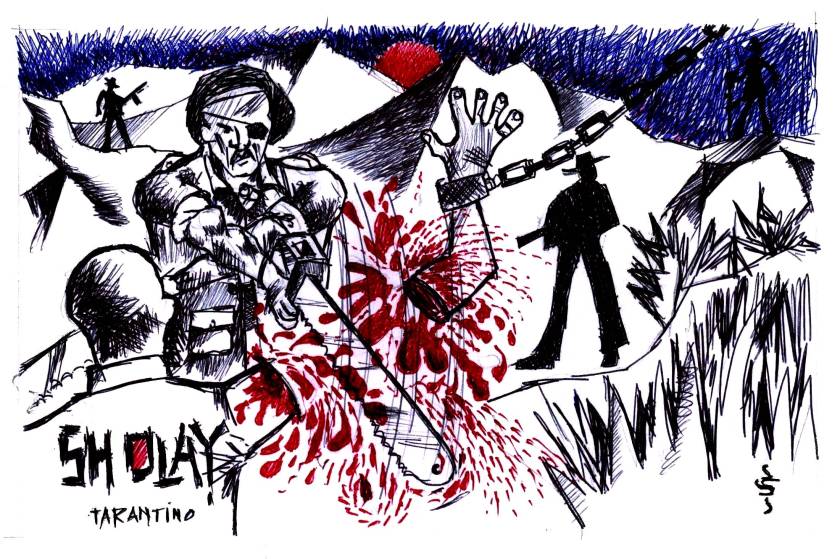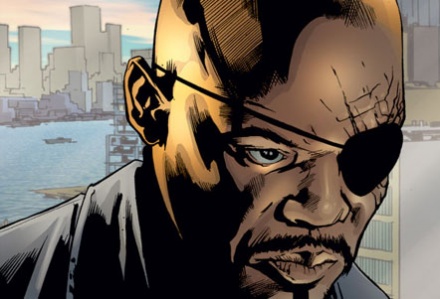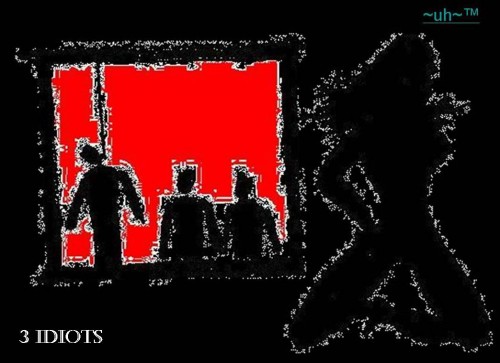This article was first published on PFC [link]
This post has been selected as as one of the ‘Top 25 Tangy Tuesday Picks‘ of the year 2010.
The Ballpen and other Poster artworks are my original work ( except for Samuel_Gabbar), so will appreciate if you add the source link if you wish to use the images.
What if ?
The mainstream Hindi Film Industry is often criticized due to its lack of originality and the tendency to piggyback ride on existing good cinema of the world. Call it rip-off, plagiarism, influence, copy, creative coincidence or whatever, but the fact still remains that it’s always a rare and pleasant surprise to find a good new release, which is based on an original script. Whenever we see a good story on screen, the first thought comes to our mind is that it must be ‘taken’ from some already successful movie script, because that’s what the trend for commercial cinema has been. In short; if it’s not a masala, it’s must be a copy.
But, what if the trend is reversed? What happens if the world renowned Directors start getting ‘influenced’ by the superhit masala Hindi films? What if they remake the famous, cult and highest grossing Hindi films in their own style? Won’t it be a treat to us movie lovers, a double whammy of sorts? Foreign director cooks the desi masala, and in their own style.
So I sit down with a khamba of Old Monk, create a thick cloud of Eyjafjallajökullic smoke out of Classic milds and let my imagination run wild, wearing the shoes of some of my favorite directors…..
Warning: Article contains text and artworks depicting violence, sex and disdain to convention. Reader’s discretion solicited.
————————————————————————————————————–
Quentin Tarantino remakes Sholay
(Tarantino says it’s the most exhilarating experience, making his remake after RGVs)
We all know Sholay is inspired from Kurosawa’s Seven Samurai. But once Sholay was made, it became Sholay and had it’s own identity. So remaking Sholay is not the same as remaking Seven Samurai, in case one tend to become confused.
The four hour long film will be divided into eight major scenes, each around half an hour long. The movie would start with the final confrontation of Thakur (Lawrence Tierney) and Gabbar (Samuel L Jackson), where the opening credits would roll. Thakur will have robotic arms and legs equipped with rocket launchers and machine guns. Thakur will brutally kill Gabbar inside his loo, while Gabbar peeing.

The next scene would be a long conversation between Thakur, Jay (Eli Roth) and Veeru (Michael Madsen) about the Gabbar assignment. This will be followed by the Holi shootout followed by the train and dacoits scene. The dacoits would be on dirt bikes firing shotguns. Basanti (Vanessa Ferlito) would flirt with Jay, instead of Veeru. Veeru, while faking the ‘soocide‘, will suddenly fall from the overhead water tank and die. Gabbar will kill Basanti in frustration as she would try to seduce him, during the torture session. Jay and Veeru would kill Asrani’s character (cameo by Tarantino himself) before the jailbreak. They would suddenly behead Jagdeep (Steve Buscemi) after a 2 minutes laugh session together. The excised head would still shown to be laughing. Gabbar’s ‘Russian roulette’ (to aab goli kha !) scene would feature as bonus under deleted scene in the DVD release. So will be Hungal’s ‘itna sannata kyun hai bhai’ monologue and Basanti’s striptease to Gabbar.

Gabbar would use a heavy duty industrial sawing machine to cut Thakur’s hands, legs and also castrating him. Gabbar will scathingly mention that he doesn’t want Thakur to reproduce again so that his offspring could never take revenge on him. Gabber would snort coke and would be impotent. The fountain of blood oozing out of the limbless Thakur would drench the entire cast present in the scene including Sambha (Tarantio wanted it to be played by Mac Mohan only) and the gang. The bloodstream then further flow down to the village. The village dog will be shown to lick the blood while Ramukaka playing GNR’s ‘November rain’ on saxophone.
The longest scene would be the massacre of Thakur’s family shown at the last. Samurai swordsmen on dir bikes would do the killing with Nirvana’s ‘All apologies’ playing as the BGM.
———————————————————————————————————————
Bernerdo Bertolucci remakes Dilwale Dulhaniya Le Jayenge
(This movie is also gets red signal from censor board for explicit sexual content)

Raj meets Simran on a train, has sex in the luggage compartment and part ways without even asking each other’s name. Then they meet again in Switzerland and have sex again, this time in a hotel room. Simran leaves Raj while he is asleep, who is then desperate to find her. He traces her back in India, in the remote village of Punjab. He finds that Simran is about to get married. Raj pretends to be a family friend of Kuljeet, Simran’s fiancé. They have a secret meeting following by sex in the ‘sarson ke khet’ where Simran’s father sees them. Next day they find a heap of dead pigeons being eaten by vultures. Raj eventually discovers that Kuldeep is a misogynist and kills him. Meantime Simran’s sister Preeti seduces Raj and they have a wild romp in the barn. But soon Raj gets disillusioned with both Preeti and Simran. He tries committing suicide by drinking many glasses of lassi but fails. As he tries to regain his lust towards Simran, she comes to know about his relationship with Preeti, she drowns Raj in a tub full of lassi.
In the last scene, Preeti is shown to drive a tractor with Simran towards the sarso ka khet while some pegions flies up, disturbed by the loud noise of the engine. In silhouette, only one of them is shown to return while the sun sets in the backdrop.
———————————————————————————————————————
David Lynch remakes Rab Ne Bana Di Jodi
(As usual Lynch refuses to provide any explanation of the film and leaves it to the audience interpretation)
Surrinder Suri (Chris Isaak) is a loner alcoholic simpleton, who works in the Electricity department of a small town but lives in a dark palatial mansion lit only by candles. Various insects crawl around him and a red lizard like creature makes modem like sound intermittently. His house is so big that some of the corridors looks like a tunnel to limitless darkness. However, when Surinder walks into any of the dark corridors it always leads to the living room.

He spends sleepless nights watching a headless transgendered belly-dancer on his laptop screen who after every dance session dissolves into pixels which he saves in his pen drive as media file. Taniya (Naomi Watts) is the girl with a dark past and disturbed childhood. She gets flashes of her riding pillion with a muscular hunk on a motorcycle riding on an one way road opposite the traffic flow. Taniya’s would be husband suddenly disappears along with the vehicle on the same day of their wedding. The incident leaves Taniya shocked and depressed. An unknown man calls Taniya asking if she would like to know a secret about his father. She gets perplexed to discover that the phone line is lying dead. There’s a hint of incestuous relationship with his professor father, who before dying because of a wrong medication overdose, asks Surinder to take care of Taniya. Suri marries Tanya and takes her to his dark mansion. While Suri leaves for work, Taniya discovers that the red lizard actually eats the fuse wire which disconnects the electric supply. In a feat of rage she kills the lizard with a kitchen knife. In the night Suri is surprised to see his house lit, but gets a shock to see footage of his wife killing the lizard on TV. He tries to look for Taniya, but could not find her. He walks into a dark corridor which leads to a street with a bike parked on it. He rides it and reaches to the dance class where Taniya is practicing. During his ride he transforms into a sculpted dude whom Tani could not recognize but agrees to partner with. They have sex on the bike in the first night after the dance class. The same routine repeats everyday. One day Suri takes Tani out of the city, atop a hillock she could see the letters ‘I Love you’ displayed by the building lights. Suddenly some kind of short-circuit happens and the entire city catches fire. While Tani screams, the headless dancer appears and beheads Tani. The decapitated Tani runs towards the fire where Suri is pulled into a spiraling black tunnel and he loses consciousness.
In the next scene he is shown waking up in Tani’s house dressed in bridal attire, where he sees Tani’s dad sitting on the couch while Tani is watching the dance competition on TV. The arrangements around hints that it is Tani’s wedding day.
Suri hears a modem like sound, comes out of the house and finds the bike. The movie ends with he leaving the place riding the bike.
———————————————————————————————————————
Roman Polanski remakes 3 Idiots
(The movie is disapproved by censor and banned in India citing that would hurt Indian sensibilities)
There would be slight changes in the characterizations and the storyline. Rancho would be a gay scientologist, Farhan would be an alcoholic photography lover and Raju would be a drug addict loser, suffering from chronic depression and anxiety. Virus would be a Satanist, practicing occult sciences in his office during lunch break. Pia would be a mysterious lady who is an androphobic witch doctor. While treating the ailment of Raju’s dad she accidentally would suffocate him to death. Rancho would carry the corpse in his scooter and sell it to underground corpse dealers for money. He will use the money to fund his underground scientology club.

The focus of the film would be more on the psychotically challenging characters disturbed by their respective educational background and the conflict of their societal existence. Chatur would be an imaginary character, often appearing in the delirium of Raju. Farhan would commit suicide by asphyxiating himself with negative rolls, after repeatedly being rejected for internship by his idol.
On the stormy night Pia’s sister would give birth to a baby demon and Virus would be struck by lightening at the same time. Rancho would steal the proverbial pen from his charred remains and vanish into thin air. Raju will have a hallucinatory trip to Ladakh with Farhan and Chatur, where they would discover Rancho living with milimetre, his partner now and the demon baby.
In the last scene Raju would be shown confronting an interview panel with his dad’s corpse on the table, while Pia sits naked on a chair and laughs.
———————————————————————————————————————
Given an opportunity I would love to outline the following remakes as well,
James Cameron – Jodha Akbar (3D)
Wong Kar Wai – Dostana
Troy Duffy – Karan Arjun
Pedro Almodovar – Taare Zameen Par
Kim Ki Duk – Maine Pyar Kiya
The Ballpen and other Poster artworks are my original, so will appreciate if you add the source link if you wish to use the images.











